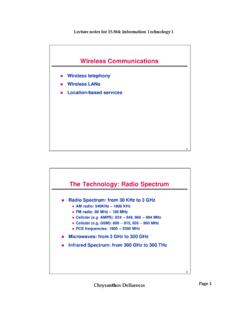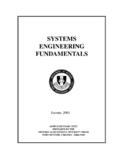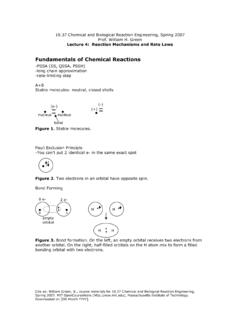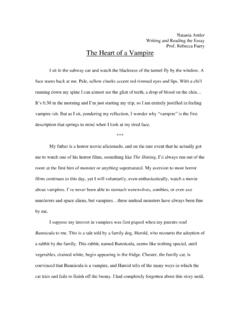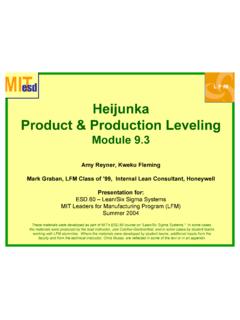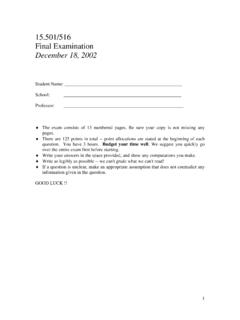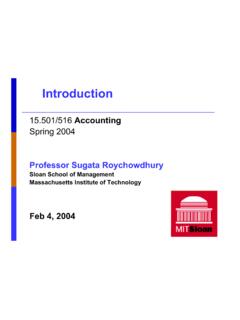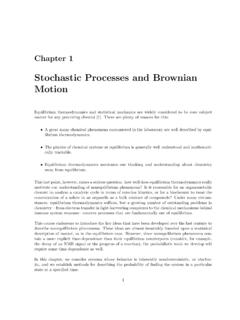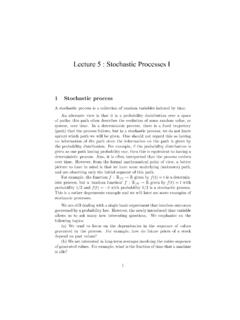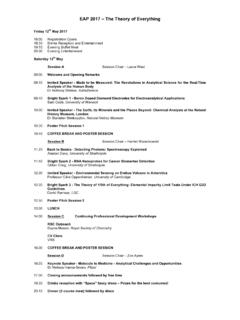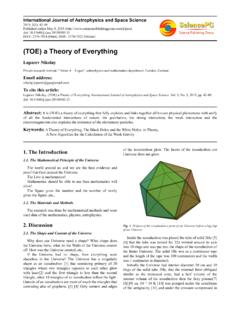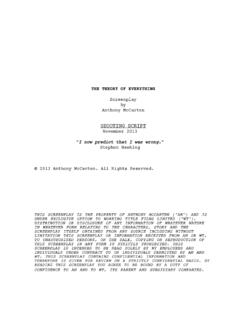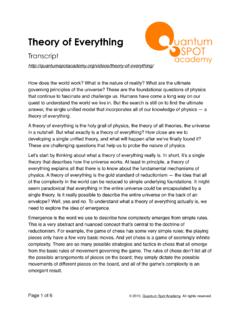Transcription of a “Theory of Everything” Even - MIT OpenCourseWare
1 Lecture Notes 7: Musings on the theory of everything and Reality 1 Is a theory of everything even Possible? In Lecture Notes 6, I described the ongoing quest of theoretical physicists to day in uncovering the theory of everything that describes Nature. Nobody knows yet what that theory is it would have to somehow reconcile the conflict between quantum theory and general relativity, , it would have to be a theory of quantum gravity but people are certainly trying, and many optimistic people even feel that we re almost there.
2 I personally have no idea if we re close at all, because I am definitely not an expert on any candidate theory of quantum gravity. However, I do feel that we ve come a long way in the past 100 years. And, when I marvel at the progress we ve made, it makes me feel that, some day, we will finally have the correct theory of quantum gravity. Whether that day is 50 years from now or 500 years I won t try to guess. But it seems like we can understand the Universe. In deed, as Einstein once mused: The most incomprehensible thing about the Universe is that it is comprehensible.
3 But is the Universe really comprehensible? We can certainly understand aspects of the Universe today, but could we someday understand everything about it? The prospect of understanding everything not only the laws of physics, but also the state of every single object in the (possibly infinite) Universe probably seems rather bleak. After all, we humans are only only small, finite systems in an incredibly vast (possibly infinite) Universe, so maybe complete knowledge of every system in the Universe is impossible to attain.
4 But perhaps we can still completely figure out the rules that describe these systems, , the laws of physics. Maybe. But first, let s take a step back. One of my goals for this class has been to explain the best answers physicists have to big, foundational ques 2 tions at a purely conceptual level. And I think I can convey the sense of these ideas purely conceptually. However, deep down, these physical theories that I ve been describing general relativity, quantum mechanics, string theory , and so forth are mathematical in nature.
5 Strictly speaking, these theories are nothing more than a bunch of mathematical equations that physicists interpret as explaining the world. And, because these theories can be pretty complicated mathematically, I ve refrained from trying to explain them at a mathematical level; I haven t assumed any mathematical knowledge other than knowledge of what multiplication is. But it s important to understand that all of our theories of physics are actually precise, mathematical theories. everything I ve described in all of these notes and in the lectures can be traced back to precise, meaningful mathematical notions.
6 So, if anything I ve said has sounded vague or unclear, you ll just have to take my word that everything actually makes good sense when you study the theories in their full mathematical detail. G odel s Incompleteness Theorem I d now like to describe one of the most surprising results discovered in mod ern mathematics, and I ll soon turn to how it applies to the theory of every thing. But first, the question: what is mathematics? Most of us, when we ve first exposed to math, don t really see it as much more than a set of tools or a bag of tricks.
7 If you want to describe one situation in the world, you use a certain set of tools algebra, for example and if you want to describe another situation, you use some other tools geometry, say. But this isn t the way that a pure mathematician would view mathemat ics. To a mathematician, mathematics really has a life of its own, kind of an abstract form of existence. We may see certain mathematical objects in our everyday life various shapes and numbers, for example but math ematicians also study many objects that don t seem to appear anywhere in the real world.
8 A simple example is imaginary numbers, to be distinguished from real numbers. Real numbers are the numbers most familiar to us. They include the integers whole numbers like 4, 7, and 0, and their negatives like 4 and 7 as well as non-integers numbers like , , and And a simple thing we learn early on is that the square of a real number the real number multiplied by itself is always a positive number (or zero), since a positive number times a positive number is a positive number, and a 3 negative number times a negative number is also a positive number.
9 Thus, every real number is the square root of some positive number (or zero). For example, 3 is the square root of 9, since 3 3 = 9, and 4 is the square root of 16, since 4 4 = 16. What s the square root of 1? Well, it can t be any real number, because the square of every real number is greater than or equal to 0. However, there s nothing stopping me from simply defining a number, which I designate by the symbol i, which has the property that i i = 1 (so that 2i 2i = 4, = , etc). Such numbers are called imaginary numbers to distinguish them from the real numbers.
10 Now, when we look at the world around us most of us don t see imaginary numbers anywhere. We certainly don t count in units of imaginary numbers, and we definitely don t measure things to have imaginary quantities. So the imaginary number system seems to be a purely abstract thing that doesn t find its place in the real world. And there are many other purely abstract entities that mathematicians deal with that don t seem to have anything to do with the real world. Imaginary numbers are just a particularly simple example to describe.
